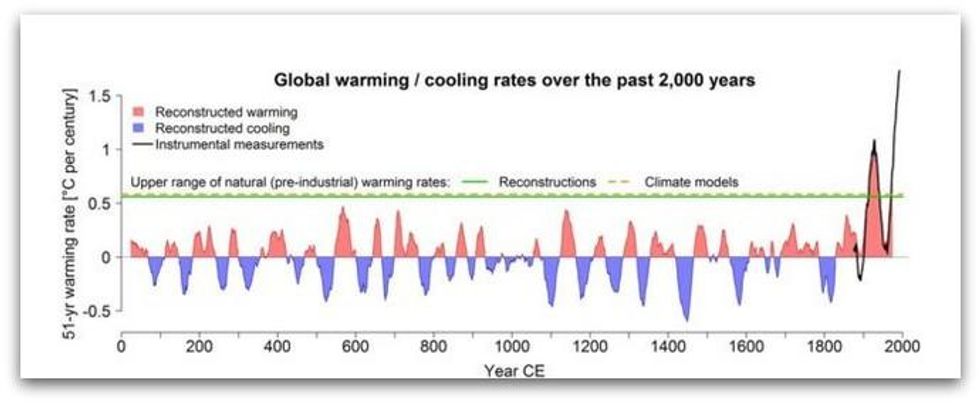

SUBSCRIBE TO OUR FREE NEWSLETTER
Daily news & progressive opinion—funded by the people, not the corporations—delivered straight to your inbox.
5
#000000
#FFFFFF
To donate by check, phone, or other method, see our More Ways to Give page.


Daily news & progressive opinion—funded by the people, not the corporations—delivered straight to your inbox.

A protester is seen holding a placard during a climate change demonstration. (Photo: Ronen Tivony/SOPA Images/LightRocket via Getty Images)
As France, India, the U.S., and other nations face unprecedented and deadly heat waves, new research published Wednesday showed the planet has warmed more quickly in recent decades than at any point in the past 2,000 years.
The new research, published in the journals Nature and Nature Geoscience, draws upon historical data which demonstrates warming in the 20th century has been more rapid and widespread than in the past, refuting climate deniers' common refrain that current warming is part of a natural cycle.
As the BBC reported, the research team "reconstructed the climate conditions that existed over the past 2,000 years using 700 proxy records of temperature changes, including tree rings, corals and lake sediments" and "determined that none of these climate events occurred on a global scale."
By contrast, the new research (pdf) states, "the warmest period of the past two millennia occurred during the twentieth century for more than 98 percent of the globe."
"This provides strong evidence that anthropogenic global warming is not only unparalleled in terms of absolute temperatures," said the scientists, "but also unprecedented in spatial consistency within the context of the past 2,000 years."

Scott St. George, a physical geographer at the University of Minnesota in Minneapolis, said of the new research that the "familiar maxim that the climate is always changing is certainly true."
"But even when we push our perspective to the earliest days of the Roman Empire," St. George added, "we cannot discern any event that is remotely equivalent--either in degree or extent--to the warming over the last few decades."
The research comes as people across the globe are pressuring their governments to treat the climate crisis as an emergency and act accordingly.
As Common Dreams reported Wednesday, thousands of people in more than 150 countries are expected to take part in climate strikes in September.
"Our house is on fire--let's act like it," says the strikes' call-to-action. "We demand climate justice for everyone."
Dear Common Dreams reader, The U.S. is on a fast track to authoritarianism like nothing I've ever seen. Meanwhile, corporate news outlets are utterly capitulating to Trump, twisting their coverage to avoid drawing his ire while lining up to stuff cash in his pockets. That's why I believe that Common Dreams is doing the best and most consequential reporting that we've ever done. Our small but mighty team is a progressive reporting powerhouse, covering the news every day that the corporate media never will. Our mission has always been simple: To inform. To inspire. And to ignite change for the common good. Now here's the key piece that I want all our readers to understand: None of this would be possible without your financial support. That's not just some fundraising cliche. It's the absolute and literal truth. We don't accept corporate advertising and never will. We don't have a paywall because we don't think people should be blocked from critical news based on their ability to pay. Everything we do is funded by the donations of readers like you. Will you donate now to help power the nonprofit, independent reporting of Common Dreams? Thank you for being a vital member of our community. Together, we can keep independent journalism alive when it’s needed most. - Craig Brown, Co-founder |
As France, India, the U.S., and other nations face unprecedented and deadly heat waves, new research published Wednesday showed the planet has warmed more quickly in recent decades than at any point in the past 2,000 years.
The new research, published in the journals Nature and Nature Geoscience, draws upon historical data which demonstrates warming in the 20th century has been more rapid and widespread than in the past, refuting climate deniers' common refrain that current warming is part of a natural cycle.
As the BBC reported, the research team "reconstructed the climate conditions that existed over the past 2,000 years using 700 proxy records of temperature changes, including tree rings, corals and lake sediments" and "determined that none of these climate events occurred on a global scale."
By contrast, the new research (pdf) states, "the warmest period of the past two millennia occurred during the twentieth century for more than 98 percent of the globe."
"This provides strong evidence that anthropogenic global warming is not only unparalleled in terms of absolute temperatures," said the scientists, "but also unprecedented in spatial consistency within the context of the past 2,000 years."

Scott St. George, a physical geographer at the University of Minnesota in Minneapolis, said of the new research that the "familiar maxim that the climate is always changing is certainly true."
"But even when we push our perspective to the earliest days of the Roman Empire," St. George added, "we cannot discern any event that is remotely equivalent--either in degree or extent--to the warming over the last few decades."
The research comes as people across the globe are pressuring their governments to treat the climate crisis as an emergency and act accordingly.
As Common Dreams reported Wednesday, thousands of people in more than 150 countries are expected to take part in climate strikes in September.
"Our house is on fire--let's act like it," says the strikes' call-to-action. "We demand climate justice for everyone."
As France, India, the U.S., and other nations face unprecedented and deadly heat waves, new research published Wednesday showed the planet has warmed more quickly in recent decades than at any point in the past 2,000 years.
The new research, published in the journals Nature and Nature Geoscience, draws upon historical data which demonstrates warming in the 20th century has been more rapid and widespread than in the past, refuting climate deniers' common refrain that current warming is part of a natural cycle.
As the BBC reported, the research team "reconstructed the climate conditions that existed over the past 2,000 years using 700 proxy records of temperature changes, including tree rings, corals and lake sediments" and "determined that none of these climate events occurred on a global scale."
By contrast, the new research (pdf) states, "the warmest period of the past two millennia occurred during the twentieth century for more than 98 percent of the globe."
"This provides strong evidence that anthropogenic global warming is not only unparalleled in terms of absolute temperatures," said the scientists, "but also unprecedented in spatial consistency within the context of the past 2,000 years."

Scott St. George, a physical geographer at the University of Minnesota in Minneapolis, said of the new research that the "familiar maxim that the climate is always changing is certainly true."
"But even when we push our perspective to the earliest days of the Roman Empire," St. George added, "we cannot discern any event that is remotely equivalent--either in degree or extent--to the warming over the last few decades."
The research comes as people across the globe are pressuring their governments to treat the climate crisis as an emergency and act accordingly.
As Common Dreams reported Wednesday, thousands of people in more than 150 countries are expected to take part in climate strikes in September.
"Our house is on fire--let's act like it," says the strikes' call-to-action. "We demand climate justice for everyone."